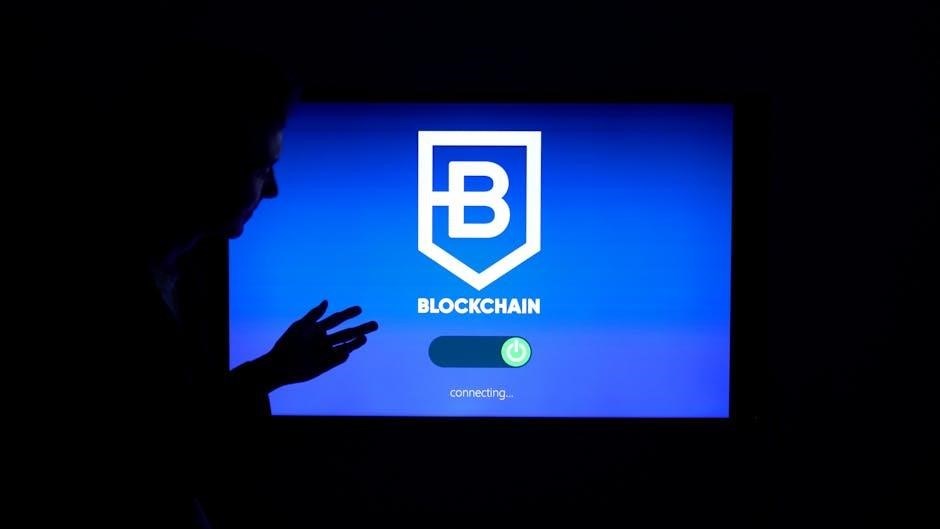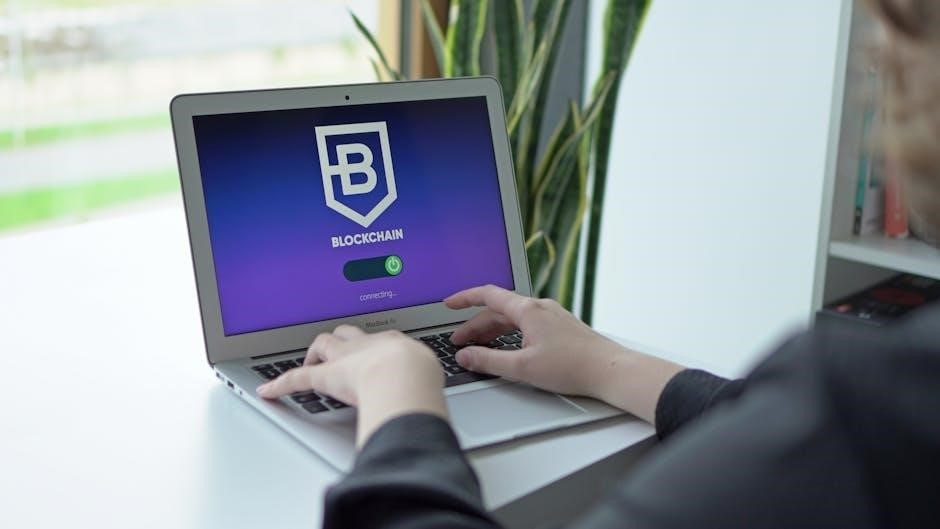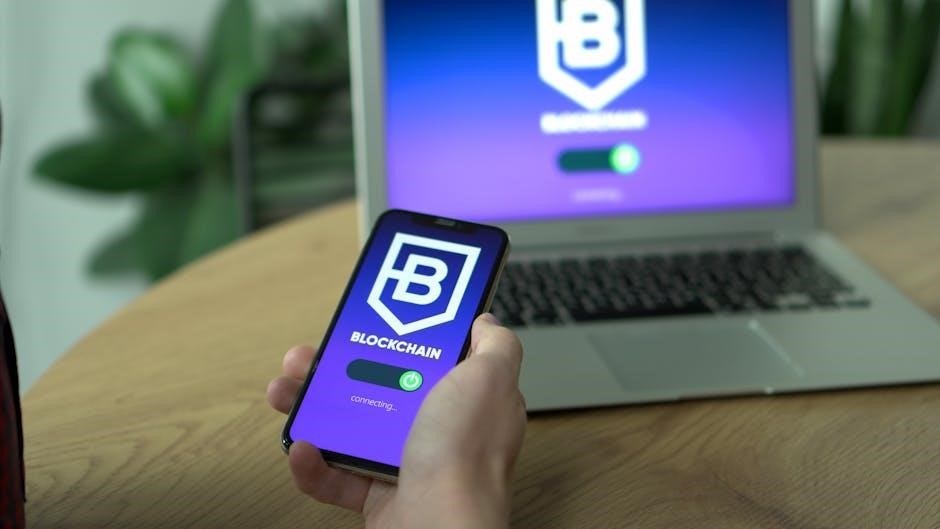Rust is a systems programming language that offers type safety‚ performance‚ and memory efficiency‚ making it ideal for building robust blockchain applications and decentralized solutions.
What is Rust and Why It Matters in Blockchain
Rust is a systems programming language emphasizing type safety‚ memory efficiency‚ and performance‚ making it ideal for blockchain development. Its unique ownership model prevents common errors like null or dangling pointers‚ ensuring robust and secure applications. Rust’s focus on concurrency and parallelism without data races is particularly valuable in blockchain‚ where scalability and security are critical.
Benefits of Using Rust for Blockchain Development
Rust offers memory safety without garbage collection‚ enabling high-performance applications. Its concurrency model prevents data races‚ crucial for blockchain’s distributed systems. The language’s compiled nature ensures efficiency‚ while its modern tooling simplifies development. Rust’s ecosystem provides libraries like Substrate for custom blockchains‚ making it a robust choice for building secure‚ scalable‚ and efficient decentralized applications and protocols.
Overview of Blockchain Applications and Rust’s Role
Rust is pivotal in blockchain‚ enabling developers to build secure‚ high-performance decentralized applications. It powers frameworks like Substrate‚ Solana‚ and NEAR‚ facilitating custom blockchains and dApps. Rust’s role spans from core blockchain architectures to smart contracts‚ ensuring memory safety and efficiency‚ making it a cornerstone in modern blockchain innovation and adoption across various industries and use cases.
Setting Up the Rust Development Environment
Install Rust using rusted or rustup and configure your IDE with essential tools like cargo and wasm32-unknown-unknown for seamless blockchain and WebAssembly development.
Installing Rust and Essential Tools
Begin by installing Rust via rusted or rustup‚ which includes the cargo package manager. Next‚ install wasm32-unknown-unknown for WebAssembly support. Ensure your system has Node.js and npm installed for blockchain-related dependencies. Additionally‚ install an IDE like Visual Studio Code with Rust extensions for a streamlined development experience; Verify installations with rustc –version and cargo –version.
Configuring the Development Environment
Configure your IDE with Rust extensions like Rust Analyzer and cargo-edit for enhanced code completion and dependency management. Set up environment variables such as RUST_LOG for debugging and WASM_TARGET for WebAssembly compilation. Ensure your project structure follows Rust conventions and initialize a new project using cargo new. Finally‚ test your setup by building and running a simple Rust program to confirm everything works correctly.
Overview of Rust’s Ecosystem for Blockchain
Rust’s ecosystem offers powerful tools and frameworks for blockchain development‚ including Substrate for custom blockchains‚ Solana and NEAR Protocol for dApp creation‚ and libraries like web3.js and ethers.js for Ethereum integration. The ecosystem also provides Cargo for dependency management‚ Rustup for cross-compilation‚ and a strong focus on memory safety and concurrency‚ making it ideal for secure and high-performance blockchain applications.
Core Concepts of Blockchain in Rust
Blockchain in Rust involves nodes‚ P2P communication‚ and consensus mechanisms. It enables building custom architectures‚ ensuring security‚ scalability‚ and efficiency in decentralized systems using Rust’s robust framework.
Understanding Nodes and P2P Communication
Nodes are fundamental components in blockchain‚ acting as network participants that validate and relay transactions. Rust enables efficient P2P communication through libraries like libp2p‚ ensuring secure and decentralized interaction between nodes; This framework allows developers to build robust network architectures‚ enabling blockchain applications to operate efficiently and maintain consensus across distributed systems.
Implementing Consensus Mechanisms
Rust simplifies the implementation of consensus mechanisms like Proof of Work and Proof of Stake. Its type safety and concurrency features ensure reliable and efficient consensus algorithms. Libraries such as substrate-consensus provide tools for custom implementations‚ enabling developers to build secure and scalable blockchain networks with minimal overhead and maximum performance.
Building Custom Blockchain Architectures
Rust enables developers to craft tailored blockchain architectures from scratch‚ leveraging its memory safety and performance. The Substrate framework provides modular tools‚ such as substrate-vm and frame-executive‚ to design custom blockchains with specific consensus‚ runtime‚ and networking layers‚ ensuring scalability and adaptability for diverse use cases and enterprise-grade solutions.
Building a Custom Blockchain with Substrate
Substrate‚ built with Rust‚ simplifies creating custom blockchains. It offers modular components like runtime modules and consensus algorithms‚ enabling developers to design tailored blockchains efficiently and securely.
Substrate is an open-source framework built with Rust‚ designed to simplify blockchain development. It provides modular tools for building custom blockchains‚ enabling developers to create tailored networks with specific features. Substrate’s flexibility allows for the integration of various consensus mechanisms‚ runtime environments‚ and interoperability solutions‚ making it a powerful tool for decentralized application development.
Designing a Custom Blockchain
Using Rust and Substrate‚ developers can design custom blockchains tailored to specific use cases. This involves defining the blockchain’s architecture‚ choosing consensus mechanisms‚ and customizing runtime modules. The framework allows for the integration of smart contracts‚ interoperability features‚ and optimized network configurations‚ ensuring scalability and security. This modular approach enables developers to build blockchain solutions that meet precise business or application requirements efficiently.
Deploying a Blockchain on Substrate
Deploying a blockchain on Substrate involves initializing the network‚ configuring nodes‚ and setting up consensus mechanisms. Using Substrate’s built-in tools‚ developers can launch a local test network or connect to existing chains. Commands like `substrate-node` help start nodes‚ ensuring proper communication and transaction processing. Post-deployment‚ monitoring and optimization are essential for maintaining stability and performance;

Building dApps on Popular Blockchains
Rust enables efficient dApp development on Ethereum‚ Solana‚ and NEAR. Using the Foundry framework‚ developers leverage Rust’s strengths for secure and high-performance blockchain applications.
Developing and Deploying dApps on Ethereum
Rust simplifies building Ethereum dApps with tools like Foundry. Its memory safety ensures robust smart contracts. Developers can integrate Rust with EVM-compatible chains‚ leveraging its performance for decentralized finance (DeFi) and NFT applications. The language’s concurrency features enhance scalability‚ making it ideal for complex blockchain projects. Deploying Rust-based dApps on Ethereum is streamlined with modern frameworks and tools.
Creating dApps on Solana and NEAR Protocol
Rust enables efficient dApp development on Solana and NEAR Protocol‚ leveraging their high-performance ecosystems. Solana’s fast transaction throughput and NEAR’s sharded architecture complement Rust’s memory safety and concurrency features. Developers can build scalable‚ secure applications for DeFi‚ NFTs‚ and more‚ using Rust’s robust tooling and frameworks tailored for these platforms;
Best Practices for dApp Development
Adopting Rust for dApp development ensures memory safety and efficiency. Use established frameworks‚ follow modular patterns‚ and implement rigorous testing. Optimize gas usage‚ ensure audit compliance‚ and maintain cross-chain interoperability. Leverage Rust’s tooling and ecosystems like Solana and NEAR for scalable‚ secure‚ and performant decentralized applications‚ aligning with industry standards for seamless integration and reliability.

Integrating Rust with Blockchain Ecosystems
Rust’s libraries and frameworks enable seamless integration with blockchain ecosystems‚ facilitating efficient and secure interactions with platforms like Ethereum‚ Solana‚ and NEAR‚ enhancing dApp development.
Interoperability with Ethereum and Other Chains
Rust enables seamless integration and interoperability with Ethereum and other blockchain networks‚ leveraging tools like Web3.js and ethers-rs. Its compatibility with Substrate and Polkadot facilitates cross-chain communication‚ enhancing scalability and security for decentralized applications. This interoperability allows developers to build unified solutions across multiple blockchain ecosystems efficiently;
Using Rust Libraries for Blockchain Integration
Rust libraries like `web3.js` and `ethers-rs` simplify blockchain integration by providing tools for node communication‚ transaction creation‚ and smart contract interactions. These libraries enable developers to seamlessly connect Rust-built applications with Ethereum‚ Solana‚ and other blockchains‚ ensuring efficient and secure integration while leveraging Rust’s memory safety and performance capabilities.
Case Studies of Rust-Based Blockchain Applications
Notable Rust-based projects include Solana‚ NEAR Protocol‚ and Polkadot’s Substrate. These applications demonstrate Rust’s ability to build high-performance‚ secure‚ and scalable blockchain systems. Solana’s fast transaction processing and NEAR’s sharding solutions highlight Rust’s strengths in achieving efficiency and security‚ making it a preferred choice for enterprise-grade decentralized applications.
Smart Contract Development with Rust
Rust enables secure and efficient smart contract development with its memory safety features and performance capabilities‚ making it ideal for building reliable decentralized applications.
Smart contracts in Rust leverage the language’s memory safety and performance to enable secure‚ efficient‚ and scalable decentralized applications. Rust’s robust type system ensures bug-free execution‚ while its concurrency features enhance smart contract reliability. Frameworks like Web3 and Solana simplify Rust-based smart contract development‚ making it a preferred choice for modern blockchain applications.
Deploying Smart Contracts on Blockchain
Rust enables efficient deployment of smart contracts on blockchains like Ethereum‚ Solana‚ and NEAR. Using tools like Web3 and Solana’s SDK‚ developers can compile and deploy Rust-based contracts seamlessly. The language’s performance and security features ensure reliable execution‚ making Rust a preferred choice for deploying scalable and secure smart contracts across various blockchain platforms.
Advanced Techniques in Smart Contract Development
Rust-based smart contracts leverage advanced techniques like zero-knowledge proofs and cross-chain interoperability. Optimizing performance with efficient memory usage and leveraging Rust’s type system enhances security. Frameworks like ink! simplify building Substrate-based contracts‚ while integrating with Web3 tools enables seamless interaction. These methods ensure scalable‚ secure‚ and efficient smart contract development tailored for blockchain ecosystems.

Security Considerations in Rust Blockchain Development
Rust’s memory safety guarantees and type system prevent common vulnerabilities like null pointers and data races‚ ensuring secure blockchain applications without compromising performance or complexity.
Memory Safety and Security in Rust
Rust ensures memory safety through its ownership system and borrow checker‚ eliminating data races and undefined behavior without garbage collection. This prevents vulnerabilities like buffer overflows and use-after-free errors‚ critical for secure blockchain applications.
Best Practices for Secure Blockchain Applications
Adopting Rust’s ownership model‚ minimizing unsafe code‚ and using libraries like `serde` for serialization enhance security. Regular audits‚ testing frameworks‚ and adhering to Web3 standards ensure robustness. These practices mitigate risks and ensure resilient blockchain applications.
Common Security Pitfalls and Solutions
Common pitfalls include improper use of unsafe code‚ data races‚ and insecure dependencies. Solutions involve leveraging Rust’s compiler checks‚ employing safe concurrency patterns‚ and using battle-tested libraries. Regular security audits and adherence to best practices ensure secure blockchain applications.
Future of Rust in Blockchain Development
Rust’s growing popularity‚ performance‚ and security features position it as a cornerstone for future blockchain innovation‚ enabling scalable and robust decentralized applications.
Emerging Trends and Opportunities
Rust’s adoption in blockchain is growing rapidly‚ driven by its performance and security. Emerging trends include building dApps on Ethereum‚ Solana‚ and NEAR Protocol‚ leveraging Substrate for custom blockchains‚ and integrating with ecosystems like Polkadot. Cross-chain interoperability and decentralized finance (DeFi) solutions are also gaining traction‚ positioning Rust as a key player in the blockchain future.
Community and Ecosystem Growth
Rust’s blockchain ecosystem is rapidly expanding‚ supported by active communities and frameworks like Substrate. Educational resources‚ such as “Rust for Blockchain Application Development” by Akhil Sharma‚ are fostering adoption. Developers and educators are contributing through books‚ tutorials‚ and courses‚ creating a collaborative environment for innovation and growth in blockchain development with Rust.
Challenges and Potential Solutions
Despite Rust’s strengths‚ developers face challenges such as its steep learning curve and integration complexities with blockchain platforms. However‚ comprehensive resources like “Rust for Blockchain Application Development” and frameworks like Substrate provide robust tools and guidance‚ enabling developers to overcome these hurdles and build efficient decentralized applications effectively.
Rust’s role in blockchain development is transformative‚ offering robust solutions. Resources like “Rust for Blockchain Application Development” provide comprehensive guides‚ available in PDF‚ empowering developers to build efficiently.
Recap of Rust’s Role in Blockchain Development
Rust offers unmatched memory safety‚ performance‚ and concurrency for blockchain applications. Its ecosystem supports building custom blockchains‚ dApps‚ and integrating with platforms like Ethereum‚ Solana‚ and Polkadot. Resources like “Rust for Blockchain Application Development” in PDF provide hands-on guidance‚ enabling developers to harness Rust’s capabilities for secure‚ scalable‚ and efficient decentralized solutions.
Further Reading and Learning Resources
Explore resources like “Rust for Blockchain Application Development” in PDF‚ offering comprehensive guides on building decentralized applications. Online courses on platforms like Packt and Leanpub provide hands-on tutorials. Additionally‚ community forums and GitHub repositories share practical examples and frameworks for leveraging Rust in blockchain development effectively.

References
Key resources include “Rust for Blockchain Application Development” by Akhil Sharma‚ published in 2024‚ alongside online tutorials and GitHub repositories from Packt and Leanpub.
Academic Papers and Books
Akhil Sharma’s “Rust for Blockchain Application Development” (2024) is a comprehensive guide‚ available in PDF‚ focusing on building blockchains and dApps on Ethereum‚ Solana‚ and other platforms.
Online Courses and Tutorials
Explore online courses on platforms like Udemy‚ LinkedIn Learning‚ and Packt‚ offering tutorials on Rust for blockchain development. Akhil Sharma’s teachings on Rust‚ blockchain‚ and AI provide hands-on learning paths for building dApps and custom blockchains‚ ideal for both beginners and experienced developers.
Community Forums and Discussions
Engage with active communities on platforms like Reddit‚ Stack Overflow‚ and Discord‚ where developers share insights on Rust and blockchain development. Participate in discussions about building dApps‚ custom blockchains‚ and troubleshooting common issues. These forums are invaluable for learning from experts‚ finding resources‚ and staying updated on the latest trends in Rust-based blockchain applications.
